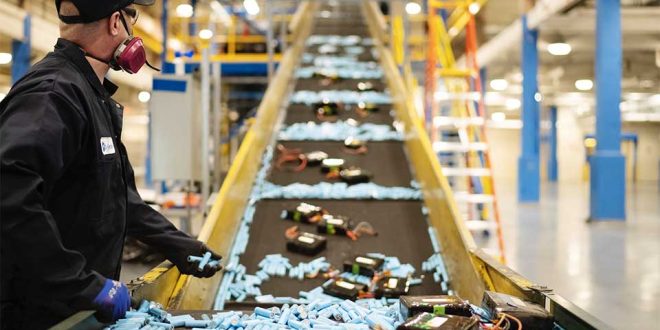The battery industry is a crucial component of modern society, powering everything from smartphones to electric vehicles. However, the production and disposal of batteries can have significant environmental impacts. As such, the industry has been working to improve its sustainability through recycling and reusing batteries.
Recycling batteries is an essential step in reducing the environmental impact of the battery industry. Batteries contain toxic chemicals such as lead, cadmium, and mercury. Which can leach into the soil and water if not disposed of properly. Recycling batteries allows these chemicals to be safely extracted and reused, reducing the risk of environmental contamination.
The recycling process begins with the collection of used batteries. This can be done through various channels, such as drop-off locations at retail stores or specialized recycling centers. Once collected, the batteries are sorted by chemistry and sent to a recycling facility.
At the recycling facility, the batteries are broken down into their component parts. The lead-acid batteries commonly used in cars, for example, are crushed and melted down to recover the lead and plastic. Lithium-ion batteries which are used in many electronic devices, are shredded and then processed to recover the valuable metals inside, such as cobalt, nickel, and lithium.
The Impact of Electric Vehicles on the Battery Industry
Reusing batteries is another way the battery industry is working to improve its sustainability. While recycling is essential, it still requires energy and resources to break down and extract the materials from used batteries. Reusing batteries, on the other hand, can extend their lifespan. Also reduce the need for new batteries to be produced.
One example of battery reuse is in electric vehicles. As the batteries in these vehicles age and lose their capacity, they may no longer be suitable for use in a car. However, they can still be used for other purposes, such as energy storage for homes or businesses. By repurposing these batteries, the industry can reduce waste and extend the life of the materials used to make them.
Another example of battery reuse is in the growing market for second-life batteries. These are batteries that have been removed from their original application, such as an electric vehicle, but still have enough capacity to be used in other applications. Second-life batteries can be used in a variety of ways, such as providing backup power for data centers or supporting renewable energy systems.
While recycling and reusing batteries are essential steps in improving the sustainability of the battery industry, there are still challenges to overcome. One of the biggest challenges is the lack of a standardized recycling process. Different types of batteries require different recycling methods, and there is currently no universal process for recycling all types of batteries.
Another challenge is the cost of recycling and reusing batteries. While these processes can reduce the environmental impact of the battery industry, they can also be expensive. As such, there is a need for incentives and regulations to encourage the industry to adopt more sustainable practices.
In conclusion, the battery industry is working to improve its sustainability through recycling and reusing batteries. These practices can reduce the environmental impact of the industry by safely extracting toxic chemicals and extending the lifespan of materials used to make batteries. However, there are still challenges to overcome, such as the lack of a standardized recycling process and the cost of these practices. By addressing these challenges, the industry can continue to improve its sustainability and reduce its impact on the environment.
 AksaraHijau.Id Kreatif, Inovatif dan Menginspirasi
AksaraHijau.Id Kreatif, Inovatif dan Menginspirasi



